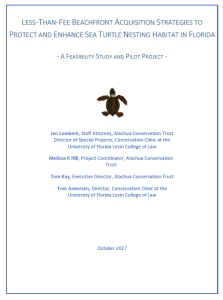Grant: 16-002C
Project Title: Less-Than-Fee Beachfront Acquisition Strategies to Protect and Enhance Sea Turtle Nesting Habitat
Project Manager: Tom Kay
Organization: Alachua Conservation Trust, Inc. (Non-Profit Organization)
Grant Amount: $18,000.00
Completion Date: 2017-11-08
Summary: Alachua Conservation Trust (ACT), in partnership with the Sea Turtle Conservancy and the University of Florida Conservation Clinic, will conduct a feasibility assessment for using coastal easements for sea turtle conservation in Florida. Using input and data from the Florida Fish and Wildlife Conservation Commission and the U.S. Fish and Wildlife Service, the project will evaluate the acquisition of conservation easements and other interests on priority beachfront locations in order to preserve nesting sites. Phase I will identify priority locations where conservation easements and other types of interests would maximize the preservation and maintenance of sea turtle habitat. In Phase II, ACT will negotiate acquisition of conservation-focused interests in those priority locations with the titleholders. Acquiring conservation interests in these lands will protect nesting habitats from future development permanently, and will increase the stewardship that is necessary to ensure healthy sea turtle habitats. ACT will also increase the educational awareness among the coastal residents of Florida through activities involving outreach to coastal stakeholders, including property owners regarding impacts to nesting habitat as coastal armoring, lighting, beach furniture and other obstructions. Supplemental funding will enable the principle investigators to secure the second year of funding for a research assistant to assist with information gathering, including data and analysis associated with target properties.  Results: The main focus of this report is on a less-than-fee property interest called a conservation
easement, an increasingly popular tool in land conservation. Since conservation easements have
traditionally been used on large, relatively natural expanses of land, their use on coastal
properties, which tend to be relatively small, expensive, and developed, has not been adequately
tested. This report addresses the potential for conservation easements to supplement the existing
suite of tools available to protect the beach-dune system generally, and sea turtles specifically.
To do this we first sought to identify the areas of high density nesting where additional
conservation would add value to existing measures. Once these areas were identified we mined
property appraiser databases to find those properties that fit a suite of pre-determined criteria –
residential beachfront properties within one mile of a protected area. We then created a survey to
assess the level of knowledge of residential property owners concerning the beach-dune system,
sea turtles, and conservation easements. The survey also tested the willingness of residential
property owners to consider conservation easements on their property. The results are
encouraging.
Results: The main focus of this report is on a less-than-fee property interest called a conservation
easement, an increasingly popular tool in land conservation. Since conservation easements have
traditionally been used on large, relatively natural expanses of land, their use on coastal
properties, which tend to be relatively small, expensive, and developed, has not been adequately
tested. This report addresses the potential for conservation easements to supplement the existing
suite of tools available to protect the beach-dune system generally, and sea turtles specifically.
To do this we first sought to identify the areas of high density nesting where additional
conservation would add value to existing measures. Once these areas were identified we mined
property appraiser databases to find those properties that fit a suite of pre-determined criteria –
residential beachfront properties within one mile of a protected area. We then created a survey to
assess the level of knowledge of residential property owners concerning the beach-dune system,
sea turtles, and conservation easements. The survey also tested the willingness of residential
property owners to consider conservation easements on their property. The results are
encouraging.